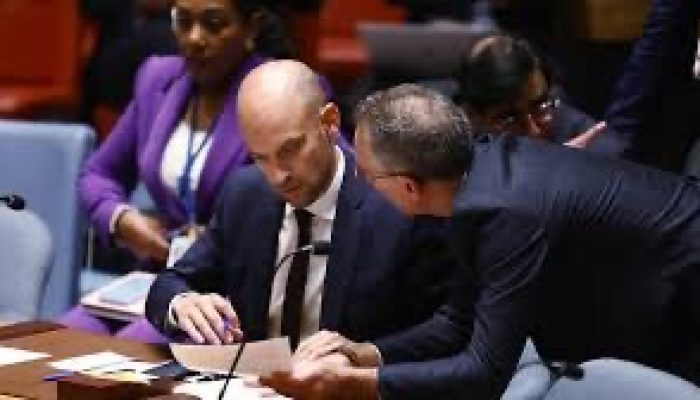France has proposed a 21-day ceasefire in Lebanon, as the death toll from Israel’s bombs on Hezbollah rose.
Shortly after Presidents Joe Biden and Emmanuel Macron spoke at the United Nations, France revealed the plan at an emergency Security Council session.
French Foreign Minister Jean-Noel Barrot stated that the two Western nations are proposing a 21-day truce “to allow for negotiations and a more sustainable ceasefire.
“There has been important progress in the past few hours,” Barrot said.
“We’ve been working since the start of the week in New York on a diplomatic solution with our American friends in particular.”
UN Secretary-General Antonio Guterres has urged an urgent cease-fire in Lebanon, warning that “hell is breaking loose.”
Israel praised diplomatic efforts in Lebanon but did not commit to a ceasefire, pledging to pursue its objective of degrading Hezbollah.
“We are grateful for all those who are making a sincere effort with diplomacy to avoid escalation, to avoid a full war,” Israel’s envoy to the United Nations, Danny Danon, told reporters before entering the session.
He added: “We will use all means at our disposal, in accordance with international law, to achieve our aims.”
The bloodshed follows the failure to achieve a cease-fire in Gaza, where Israel has been attempting to eliminate another Iranian ally, Hamas, who carried out Israel’s bloodiest attack in history.
Iranian Foreign Minister Abbas Araghchi has cautioned that Tehran, which has in recent weeks refrained from retaliating against Israel in response to attacks on Iranian interests, may no longer be able to do so. “The region is on the verge of a full-blown disaster.
“If left unchecked, the world will suffer catastrophic consequences,” he warned reporters. Hezbollah wields considerable power in Lebanon, which has been tumultuous for many years. When questioned by reporters if a ceasefire was conceivable, the country’s foreign minister, Abdallah Bou Habib, replied, “Hopefully yes.”
– ‘Acute’ risk of escalation –
Despite repeated US attempts to avert a larger war, Israel continued its onslaught in Lebanon. “Risk of escalation in the region is acute,” stated Secretary of State Antony Blinken, who has made ten trips to the Middle East since the Hamas attack on October 7, 2023.
“The best solution is diplomacy, and our coordinated efforts are critical to preventing further escalation and paving the way for greater peace and stability,” Blinken said as he met with Gulf Arab colleagues at a New York hotel. Since the start of the Gaza war, Israel and Hezbollah had been fighting on a smaller scale.
Last week, Hezbollah’s pagers and other mobile communications devices exploded in an operation widely ascribed to Israel. Hundreds have killed and hundreds have been displaced since Israel began its strikes, with the Lebanese health ministry reporting that 72 more people died on Wednesday.
According to diplomats, the US is no longer directly tying its failing campaign for a Gaza ceasefire to Lebanon’s efforts. US authorities stated that their primary goal was to avert a larger conflict.
“An all-out war is possible,” Biden said on ABC’s chat show “The View.
“What I think is, also, the opportunity is still in play to have a settlement that could fundamentally change the whole region,” Biden said.
The deputy US ambassador to the United Nations, Robert Wood, expressed concern to the Security Council about the casualties in Lebanon. However, he also blamed Hezbollah, accusing it of breaking Security Council resolutions through its collaboration with Hamas since October 7.
“Nobody wants to see a repeat of the full-blown war that occurred in 2006,” Wood informed the crowd. However, he stated that any resolution to the issue must involve a “comprehensive understanding” that maintains peace along the Blue Line between Israel and Lebanon.
Written by Jennifer Amarachi




